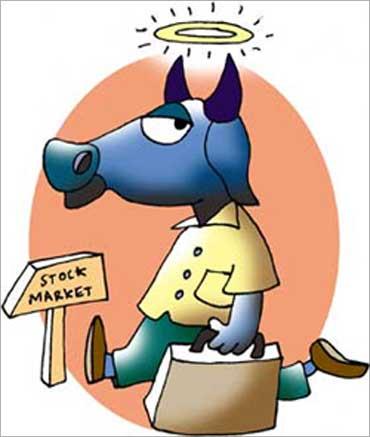
You may invest even at current market levels provided you have an investment horizon of five years or more.
Priya Nair, Sanjay Kumar Singh and Tinesh Bhasin speak to market experts about what investors should do as the Nifty crosses the 10,000 point landmark.
Illustration: Uttam Ghosh/Rediff.com
Invest gradually and on corrections to reduce losses; long-term investors shouldn't make the mistake of quitting equities entirely
Equities have given a return of around 20 per cent since the start of the year.
While investors are happy with their gains, they are also concerned: Are valuations too high?
Should one deploy fresh money at current levels?
Is a correction round the corner?
Should one sell and exit?
But what if one misses out on further gains if the rally continues?
We spoke to market experts for their views on how retail investors should deal with the current conditions.
Valuations and earnings are key concerns
One universal concern is that valuations are no longer attractive.
Says Jyotivardhan Jaipuria, managing director, Veda Investment Managers: "The market is trading at nearly 20 times one-year forward earnings. Typically, with such valuations, returns tend to be lower than in the past. We could see both a price and a time correction."
According to Sunil Singhania, chief investment officer-equity investments, Reliance Mutual Fund, the worry lies in the mid- and small-cap space.
"While large-cap stocks are also expensive, by and large, their valuations can be justified," he says.
He also sees signs of euphoria in the primary market.
The turnaround in earnings, which has got delayed is another concern.
Says S Naren, executive director and CIO, ICICI Prudential AMC: "A major reason for the recent rally has been the expected turnaround in corporate earnings. If it fails to materialise, the markets might witness a change in sentiment."
On the global front, there is concern about the long spell of easy liquidity drawing to an end.
The US Federal Reserve is taking measures to shrink its balance sheet and other central banks, too, are taking measures to pull out liquidity.
"If growth does not come back at a time when liquidity is getting curtailed, and given the high valuation situation, returns could be low in the future," says Jaipuria.
Farm loan waivers and the high level of non-performing assets in banking are other worries.
What should you do?
Despite these concerns, the dilemma for equity investors is that the prospects of other asset classes don't look enticing.
Gold and real estate have been non-performers for a few years.
With interest rates coming down, bank fixed deposit rates have fallen and future returns from debt funds might not match those in the recent past.
Experts say you may invest even at current market levels provided you have an investment horizon of five years or more.
If you have a pool of money to deploy, do so slowly over the next few months at different price levels.
"Break your funds into two or three parts and invest when markets correct by 5 to 7 per cent," advises Singhania.
Mutual fund investors should continue with systematic investment plans in their portfolios' core funds.
Naren advises that retail investors who are apprehensive about entering the markets at current levels do so through balanced advantage funds.
Lump sum investments could also be made through these funds, which divide your money between equity and debt.
"Even if one asset category exhibits higher volatility, the other will help cut it down," he says.
Mid- and small-cap stocks, which are trading at elevated levels, are more vulnerable to a pullback. However, this does not necessarily mean you should stay away from them entirely.
"Over three years, the story for mid-caps will probably still be good because they are generally bigger beneficiaries than large-caps when earnings recover," says Jaipuria.
"The next six months would be a period of stress and vulnerability for these stocks. If you can ride that out and invest for three years, you can make good money," adds Jaipuria.
If you believe a stock has sound fundamentals, you could still buy it.
"It's never about the market conditions in which you purchased the stock. It's about what you bought and for what time frame. Your timing could be wrong but if the stock is good and your holding period is good, you will still make returns," says Singhania.
Finally, book profits in stocks whose valuations are very high and prospects not so bright.
Similarly, if your overall allocation to equities or a sub-category within it has risen higher than the designated level, sell and rebalance your portfolio.
But don't sell and exit entirely, as getting the timing of re-entry right is difficult.












 © 2025
© 2025